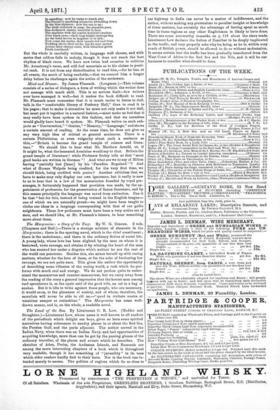not manage with much skill. This is no serious fault—few
writers ever have managed it well—but it makes the book difficult to read. Mr. Flamank must remember that it is much easier to listen to dull, talk in the "comfortable library of Fenbury Hall," than to read it in his pages ; that to make it attractive he must not only make it not dull, but must put it together in a natural fashion,—mast make us feel that it may really have been spoken in this fashion, and that we ourselves
would gladly have heard it spoken. Mr. Flamank writes on such sub- jects as "Conversation," "Genius," "Memory," "Language," and shows
a certain amount of reading. At the same time, he does not give us any very high idea of critical or general acuteness. There is a certain Philistinism or even vulgarity about such a sentence as this,—" Britain is become the grand temple of science and litera- ture." We should like to hear what Mr. Matthew Arnold, or, if it might be, what the lamented Arminius would say to that. Britain the grand temple of literature ! while Professor Seeley tells us that "most good books are written in German "! And what are we to say of Milton having " partially lost [fame] by his Paradise Regained' "2 And what of Horace Walpole being credited, for the very first time, we should think, being credited with genius? Another criticism that we have to make may only display our own ignorance, but it really is new to us to hear that in a few of the monasteries founded by royal per- sonages, it fortunately happened that provision was made, by the ap- pointment of professors, for the preservation of Saxon literature, and by this means principally the language was saved from extinction. Can it be that "but for this, instead of being trained in the English tongue— one of which we are naturally proud—we might have been taught to clothe our ideas in a language corresponding with that of our gallio neighbours. These few professors must have been a very active set of men, and we should like, at Mr. Flamank's leisure, to hear something more about them.


































 Previous page
Previous page